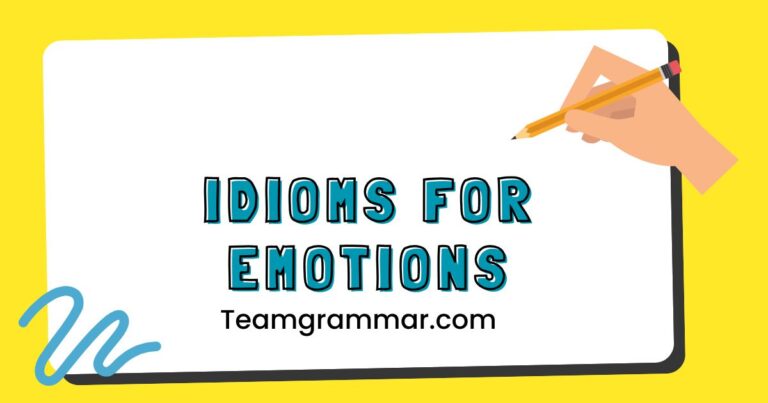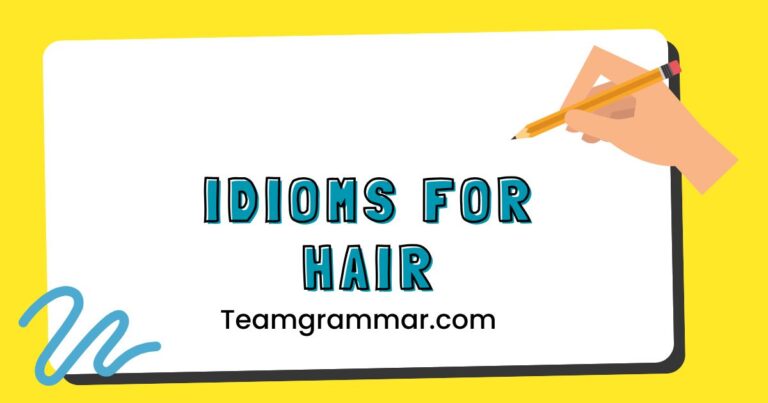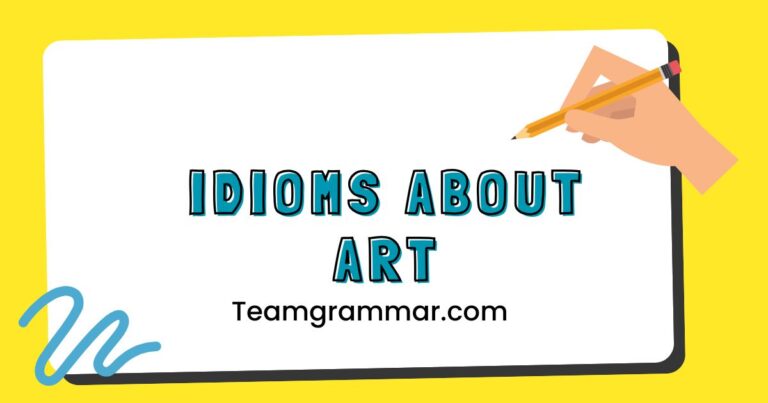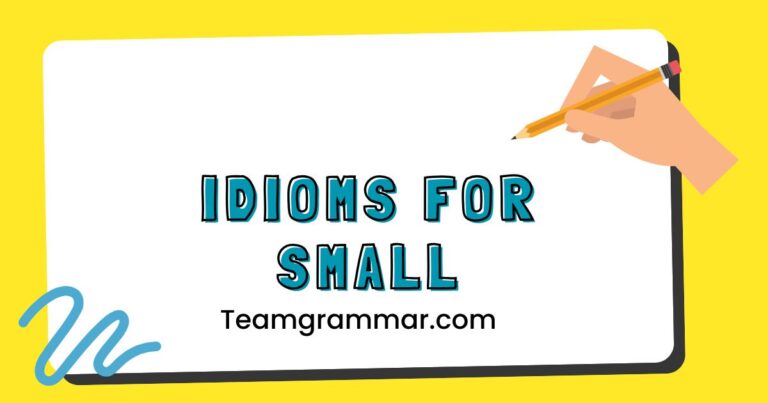47 Idioms for Free: Mastering Common English Expressions
Idioms enrich the English language, adding color, nuance, and cultural context to communication. Understanding idioms is crucial for both comprehending native speakers and expressing oneself more naturally and effectively.
This article delves into idioms related to the concept of “free,” exploring their meanings, usages, and how they enhance everyday conversations. Whether you’re an English language learner or a native speaker looking to refine your vocabulary, this guide will provide you with a comprehensive understanding of “free” idioms and their applications.
Table of Contents
- Introduction
- Definition of Idioms for “Free”
- Structural Breakdown
- Types and Categories of “Free” Idioms
- Examples of “Free” Idioms
- Usage Rules
- Common Mistakes
- Practice Exercises
- Advanced Topics
- FAQ
- Conclusion
Introduction
Idioms are phrases or expressions whose meanings cannot be understood from the literal meanings of the individual words. They are a vital part of any language, especially English, adding depth and cultural context to conversations.
Understanding idioms allows for better comprehension of spoken and written English, as well as more natural and nuanced communication. This article focuses specifically on idioms related to the concept of “free,” whether it refers to cost, freedom, or effort.
Mastering these idioms will significantly enhance your ability to understand and use English effectively in diverse settings.
Definition of Idioms for “Free”
Idioms for “free” encompass a range of expressions that relate to something being without cost, unrestricted, or requiring minimal effort. These idioms can be classified based on their primary connotation: cost-related idioms, which refer to items or services obtained without payment; freedom-related idioms, which describe situations of liberty or lack of constraint; and effort-related idioms, which indicate something achieved easily or effortlessly.
The function of these idioms is to convey these meanings in a concise and often colorful way. The context in which they are used is crucial for understanding their intended meaning, as the literal interpretation of the words may not make sense.
Structural Breakdown
The structure of idioms for “free” varies depending on the specific idiom. Some idioms are phrases consisting of a verb and a preposition (e.g., “get away with”), while others are complete sentences (e.g., “the sky’s the limit”).
Many idioms include nouns, adjectives, and adverbs that contribute to the overall figurative meaning. The grammatical structure of an idiom often does not directly correlate to its meaning.
For example, the idiom “free and clear” is an adjective phrase, but it functions to describe a state of being unburdened or without obligation. Understanding the structural elements of idioms can help in recognizing and remembering them, even if the literal meaning is obscure.
The flexibility in the usage of these idioms often depends on the context and the speaker’s intent.
Types and Categories of “Free” Idioms
Idioms related to “free” can be categorized based on the aspect of “free” they emphasize. This categorization helps in understanding the nuances and specific contexts in which each idiom is appropriately used.
Cost-Related Idioms
Cost-related idioms refer to situations where something is obtained without payment. These idioms can be used to describe items, services, or opportunities that are available at no charge.
Examples include “on the house,” “free of charge,” and “for free.” These phrases are commonly used in commercial or transactional contexts.
Freedom-Related Idioms
Freedom-related idioms describe situations of liberty, independence, or lack of constraint. These idioms often convey a sense of being unrestricted or unburdened.
Examples include “scot-free,” “at liberty,” and “footloose and fancy-free.” These idioms are used to describe personal states or circumstances.
Effort-Related Idioms
Effort-related idioms indicate that something is achieved easily or without much effort. These idioms suggest that a task or goal is accomplished with minimal exertion.
Examples include “a piece of cake,” “free ride,” and “easy as pie.” These idioms are often used to describe tasks or challenges.
Examples of “Free” Idioms
The following tables provide extensive examples of idioms related to “free,” categorized by cost, freedom, and effort. Each example is accompanied by a definition and a sample sentence to illustrate its usage.
Cost-Related Examples
The following table lists idioms related to cost, demonstrating how each one is used in a sentence.
| Idiom | Definition | Example Sentence |
|---|---|---|
| On the house | Provided free by the establishment. | The bartender offered us the next round on the house. |
| Free of charge | Without any cost. | Admission to the museum is free of charge on Sundays. |
| For free | Without payment. | We got the tickets for free because my uncle works at the theater. |
| Complimentary | Given as a courtesy or gift. | The hotel offers a complimentary breakfast to all guests. |
| At no cost | Without incurring any expense. | The software update is available at no cost to existing users. |
| Freebie | Something given away for free. | We received a freebie with our purchase at the store. |
| On the cuff | Obtaining goods or services on credit or for free. | Back in the day, he used to get his meals on the cuff at the local diner. |
| Free lunch | Something obtained without effort or cost. | There’s no such thing as a free lunch; everything comes with a price. |
| Gift horse | Something received without cost or obligation. | Don’t look a gift horse in the mouth; accept the offer graciously. |
| Without cost | Not requiring any payment. | The workshop is offered without cost to community members. |
| At no charge | Having no associated fees. | Technical support is provided at no charge for the first year. |
| Gratis | Given or done for free. | The samples were provided gratis to potential customers. |
| Free pass | Exemption from rules or consequences. | He got a free pass on the assignment because he was sick. |
| Bonus | Something extra given for free. | The company offered a year-end bonus to all employees. |
| Sweetener | Something added to make an offer more attractive. | The seller added a warranty as a sweetener to close the deal. |
| For nothing | Without any return or benefit. | All that effort was for nothing if the project fails. |
| Given away | Offered for free. | The store was giving away samples of the new product. |
| Charity case | Someone receiving assistance for free. | The organization helps those who are considered a charity case. |
| Discounted | Offered at a reduced price or for free. | The tickets were discounted for students. |
| Bargain | Something obtained at a low cost or for free. | The dress was a real bargain at the thrift store. |
| No strings attached | Without any conditions or obligations. | The offer comes with no strings attached; you can cancel anytime. |
| On special | Offered at a reduced price or for free. | The coffee is on special this week at half price. |
| Costless | Without any cost. | The community event is costless and open to everyone. |
| Comped | Given for free as a courtesy. | Our meals were comped because of the poor service. |
| Gifted | Given as a present or for free. | The artist gifted the painting to the museum. |
| Tax-free | Not subject to taxation. | The bond is tax-free, making it an attractive investment. |
| Reduced | Offered at a lower price or for free. | The price of the item was reduced for clearance. |
Freedom-Related Examples
The next table focuses on idioms associated with freedom, illustrating how they are used to express liberty and independence.
| Idiom | Definition | Example Sentence |
|---|---|---|
| Scot-free | Without suffering any punishment or harm. | The thief got away scot-free because there was no evidence. |
| At liberty | Free to do as one pleases. | You are at liberty to leave whenever you wish. |
| Footloose and fancy-free | Without responsibilities or commitments. | After graduating, she felt footloose and fancy-free and traveled the world. |
| Out of the woods | Free from danger or difficulty. | The patient is finally out of the woods after the surgery. |
| Loose cannon | Someone unpredictable and uncontrolled. | He is a loose cannon, and you never know what he will do next. |
| Free rein | Complete freedom to act or decide. | The manager gave the team free rein to develop the project. |
| Carte blanche | Complete authority or freedom to act. | The CEO gave the marketing team carte blanche to launch the new campaign. |
| Off the hook | Released from an obligation or responsibility. | He was finally off the hook when his replacement arrived. |
| Let off steam | Release pent-up emotions or energy. | He went to the gym to let off steam after a stressful day. |
| On the loose | Free from confinement or control. | The dog is on the loose in the neighborhood. |
| Free spirit | Someone who is independent and unconventional. | She is a free spirit who lives life on her own terms. |
| Free hand | Freedom to make decisions. | The artist was given a free hand in designing the mural. |
| Unfettered | Free from restrictions or constraints. | The artist’s creativity was unfettered by commercial concerns. |
| Liberated | Freed from oppression or restrictions. | The country was liberated from foreign rule. |
| Unrestrained | Not controlled or limited. | The children ran unrestrained through the park. |
| Freewheeling | Carefree and independent. | He lived a freewheeling life, traveling from place to place. |
| Open season | A time when something is permissible or unrestricted. | It’s open season on rumor and gossip during election time. |
| Running wild | Acting without control or restraint. | The children were running wild at the party. |
| At large | Free from captivity or confinement. | The escaped prisoner is still at large. |
| Free as a bird | Completely free and unconstrained. | After retiring, he felt as free as a bird. |
| Off the leash | Without control or restraint. | The project went off the leash when the manager left. |
| Free to go | Allowed to leave or depart. | After answering all the questions, he was free to go. |
| Loose ends | Unresolved issues or details. | We need to tie up all the loose ends before the project is complete. |
| Freely available | Accessible without restriction. | The information is freely available on the internet. |
| Clear the air | To remove tension or misunderstanding. | They needed to clear the air after the argument. |
| No holds barred | Without any restrictions or limitations. | The debate was no holds barred, with each candidate attacking the other. |
| Giving free hand | Allowing someone complete freedom to act or decide. | The boss is giving free hand to his team to make the changes. |
Effort-Related Examples
This table presents idioms that relate to effort, demonstrating how they are used to describe tasks that are easy or require little exertion.
| Idiom | Definition | Example Sentence |
|---|---|---|
| A piece of cake | Very easy to do. | The exam was a piece of cake for her because she studied hard. |
| Free ride | Benefiting from the efforts of others without contributing. | He’s getting a free ride on the project because he’s not doing any work. |
| Easy as pie | Very simple or easy. | Learning to ride a bike is easy as pie once you get the hang of it. |
| Walk in the park | Something very easy to do. | The interview was a walk in the park compared to the last one. |
| No-brainer | Something that requires little or no thought. | Accepting the job offer was a no-brainer because it was so good. |
| Smooth sailing | Easy and without problems. | After the initial setup, it was smooth sailing for the rest of the project. |
| Breeze through | To accomplish something quickly and easily. | She breezed through the test because she was well-prepared. |
| Fall off a log | Very easy to do. | Balancing on the beam is as easy as fall off a log for her. |
| Plain sailing | Easy and without difficulties. | Once we got past the initial hurdles, it was plain sailing. |
| Come easy | Obtained without much effort. | Success didn’t come easy; he worked hard for it. |
| Given on a platter | Received without any effort. | He expected everything to be given on a platter, but life doesn’t work that way. |
| Glide through | To move through something easily and effortlessly. | She glided through the presentation because she was confident. |
| Make short work of | To deal with something quickly and efficiently. | The team made short work of the problem and resolved it quickly. |
| Cruise through | To proceed smoothly and effortlessly. | He cruised through the semester with high grades. |
| Light work | Easy and requiring little effort. | The task was light work for the experienced team. |
| A cinch | Something very easy to do. | Fixing the computer was a cinch for the technician. |
| Take it easy | To relax and avoid stress. | You should take it easy this weekend and recharge. |
| Easy street | A comfortable and affluent lifestyle. | After winning the lottery, he was living on easy street. |
| In the bag | Assured of success. | With a substantial lead, the victory was in the bag. |
| Easy money | Money earned with little effort. | He thought he could make easy money with that scheme. |
| Free and easy | Relaxed and informal. | The atmosphere at the party was free and easy. |
| Low hanging fruit | Easy to achieve or obtain. | Let’s focus on the low-hanging fruit first to get some quick wins. |
| Doesn’t lift a finger | Does nothing to help. | He doesn’t lift a finger around the house. |
| Laze around | Relax and do nothing. | They spent the afternoon lazing around by the pool. |
| Take it lying down | Accept something without resistance. | He wasn’t going to take it lying down; he would fight back. |
| Coast through | To move easily without much effort. | She managed to coast through the semester despite missing several classes. |
Usage Rules
The proper usage of idioms for “free” requires attention to context and nuance. While some idioms can be used interchangeably, others are specific to certain situations or registers.
For example, “on the house” is typically used in hospitality settings, while “free of charge” is more common in formal announcements or advertisements. It’s also important to consider the audience and the tone of the communication.
Using informal idioms in a formal setting can be inappropriate. Additionally, be mindful of the cultural context, as some idioms may have different connotations or be unfamiliar to non-native speakers.
Understanding these usage rules can help ensure that idioms are used effectively and appropriately.
Key Considerations:
- Context: Understand the situation and choose an appropriate idiom.
- Audience: Consider who you are speaking to and their familiarity with idioms.
- Tone: Match the idiom to the overall tone of your communication.
- Cultural Sensitivity: Be aware of cultural differences in idiom usage.
Common Mistakes
One common mistake is interpreting idioms literally. For example, understanding “a piece of cake” as an actual slice of cake instead of a metaphor for something easy.
Another frequent error is using idioms out of context, leading to confusion or miscommunication. For example, saying “on the house” when referring to a friend’s home.
Also, mixing up similar idioms or using them incorrectly can change the meaning entirely. For instance, confusing “scot-free” with “carefree.” Paying attention to the specific words and their figurative meanings can help avoid these mistakes.
Examples of Correct vs. Incorrect Usage:
| Incorrect | Correct | Explanation |
|---|---|---|
| “The exam was literally a piece of cake.” | “The exam was a piece of cake.” | The idiom should be used figuratively, not literally. |
| “My house is on the house tonight.” | “Dinner is on the house tonight.” | “On the house” is used when a business provides something for free. |
| “He got away carefree.” | “He got away scot-free.” | “Scot-free” means without punishment, while “carefree” means without worry. |
Practice Exercises
Test your understanding of “free” idioms with the following exercises. Fill in the blanks with the appropriate idiom from the provided list.
Idiom List:
- On the house
- Free of charge
- Scot-free
- A piece of cake
- Free rein
| Question | Answer |
|---|---|
| 1. The restaurant offered our desserts _________ because of the long wait. | On the house |
| 2. Admission to the park is _________ for children under five. | Free of charge |
| 3. The criminal managed to get away _________ due to lack of evidence. | Scot-free |
| 4. The test was _________ for her since she had studied diligently. | A piece of cake |
| 5. The manager gave the team _________ to implement their ideas. | Free rein |
| 6. The seminar is being offered _________ to all participants. | Free of charge |
| 7. The company let the intern make changes with _________. | Free rein |
| 8. I thought the test was going to be hard, but it was _________. | A piece of cake |
| 9. The store gave the item _________ to the customer as an apology. | On the house |
| 10. Despite his crimes, he walked _________ due to a technicality. | Scot-free |
Exercise 2: Choose the correct idiom to complete each sentence.
| Question | Options | Answer |
|---|---|---|
| 1. After the surgery, he was finally _________ from danger. | a) out of the woods b) on the house c) a piece of cake | a) out of the woods |
| 2. She felt _________ after finishing all her exams. | a) scot-free b) footloose and fancy-free c) free of charge | b) footloose and fancy-free |
| 3. He’s getting a _________ on the project because he’s not contributing. | a) free ride b) free rein c) free of charge | a) free ride |
| 4. The company is offering a _________ breakfast to all guests. | a) complimentary b) scot-free c) easy as pie | a) complimentary |
| 5. You are _________ to leave whenever you want. | a) at liberty b) on the house c) smooth sailing | a) at liberty |
| 6. The project was _________ once we got past the initial challenges. | a) a piece of cake b) smooth sailing c) free rein | b) smooth sailing |
| 7. The software update is available _________ to all users. | a) for free b) on the house c) a piece of cake | a) for free |
| 8. The museum is _________ every Sunday. | a) free of charge b) a piece of cake c) at liberty | a) free of charge |
| 9. The store offered the item _________ as a promotion. | a) on the house b) easy as pie c) at liberty | a) on the house |
| 10. The suspect walked _________ due to lack of evidence. | a) scot-free b) footloose and fancy-free c) free rein | a) scot-free |
Advanced Topics
For advanced learners, exploring the etymology and historical context of idioms can provide a deeper understanding of their meanings and usages. Understanding how idioms evolve over time and across cultures can enhance linguistic awareness.
Researching the origins of specific idioms, such as “scot-free” (which comes from an Old Norse word for tax), can provide valuable insights into their cultural significance. Additionally, studying the use of idioms in literature and media can reveal how they are employed for rhetorical effect and character development.
Analyzing the subtle differences in meaning between similar idioms can also refine one’s command of the English language. Furthermore, exploring regional variations in idiom usage can broaden linguistic proficiency and cultural understanding.
FAQ
Here are some frequently asked questions about idioms for “free”:
- What is an idiom?
An idiom is a phrase or expression whose meaning cannot be understood from the literal meanings of the individual words. It’s a figurative expression that has a conventional meaning understood by native speakers.
- Why are idioms important to learn?
Idioms are essential for understanding and communicating effectively in English. They add color and nuance to conversations and are frequently used in both spoken and written English. Understanding idioms helps in comprehending native speakers and expressing oneself more naturally.
- How can I learn idioms more effectively?
Learning idioms requires exposure, practice, and contextual understanding. Reading books, watching movies, and listening to conversations can help you encounter idioms in context. Keeping a notebook of new idioms and practicing using them in your own sentences can also be beneficial.
- Are idioms the same in all English-speaking countries?
No, idioms can vary across different English-speaking countries and regions. Some idioms are specific to certain cultures or dialects. Being aware of these variations can help avoid confusion.
- Can I use idioms in formal writing?
The appropriateness of using idioms in formal writing depends on the context and tone. While some idioms are acceptable in certain formal settings, others may be too informal. It’s important to consider the audience and purpose of the writing.
- What should I do if I don’t understand an idiom?
If you encounter an unfamiliar idiom, try to infer its meaning from the context. If that’s not possible, look it up in a dictionary or ask a native speaker for clarification. Noting the context in which the idiom was used can also help you remember it for future use.
- How do I avoid misusing idioms?
To avoid misusing idioms, pay attention to their specific meanings and contexts. Practice using them in your own sentences and get feedback from native speakers. Avoid interpreting idioms literally and be mindful of their cultural connotations.
- Are there any resources for learning idioms?
Yes, there are many resources available for learning idioms, including dictionaries, websites, and language learning apps. Some resources focus specifically on idioms, providing definitions, examples, and practice exercises. Look for resources that offer contextual information and cultural insights.
- How can I practice using idioms in conversation?
Practice using idioms in conversation by actively incorporating them into your speech. Start by using one or two new idioms at a time and gradually increase your repertoire. Engage in conversations with native speakers and ask for feedback on your usage.
- What’s the difference between an idiom and a proverb?
An idiom is a phrase with a figurative meaning, while a proverb is a short, well-known saying that expresses a general truth or piece of advice. Idioms often don’t make sense literally, whereas proverbs usually do.
- Is it okay to create my own idioms?
While creativity in language is generally encouraged, creating your own idioms can lead to confusion, as idioms are, by definition, established expressions. It’s best to stick to recognized idioms to ensure clear communication.
Conclusion
Mastering idioms related to “free” enhances both your understanding and expression in English. From cost-related idioms like “on the house” to freedom-related idioms like “scot-free” and effort-related idioms like “a piece of cake,” these expressions add color and nuance to your communication.
By understanding their meanings, usages, and potential pitfalls, you can confidently incorporate them into your everyday conversations and writing. Continued practice and exposure to authentic English materials will further solidify your knowledge and improve your fluency.
Remember to pay attention to context, audience, and tone to use idioms effectively and appropriately.







